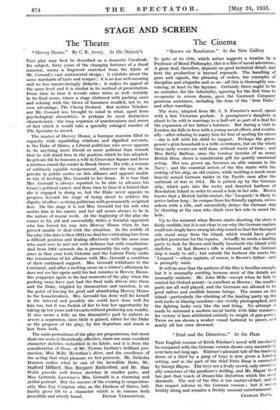The Cinema
" Brown on Resolution." At the New Gallery IN spite of its title, which rather suggests a treatise by a Professor of Moral Philosophy, this is a film of naval adventure. A great deal, therefore, depends on good technical detail, and here the production is beyond reproach. The handling of guns and signals, the phrasing of orders, the examples of discipline and etiquette and so on—all this is thoroughly con- vincing, at least to the layman. Certainly there ought to be no mistakes, for the Admiralty, agreeing for the first time to co-operate in screen drama, gave the Gaumont Company generous assistance, including the loan of the ' Iron Duke' and other warships.
The story, adapted from Mr. C. S. Forester's novel, opens with a late Victorian prelude. A greengrocer's daughter is about to be sold in marriage to a half-wit as part of a deal for the expansion of her father's business. But during a visit to London she falls in love with a young naval officer, and eventu- ally—after refusing to marry him for fear of spoiling his career —she is left with his child to support. Perhaps the green- grocer's grim household is a trifle overdrawn, but on the whole these early events are well done, without waste of time ; and Miss Betty Balfour, once the tomboy heroine of so many British films, shows a considerable gift for quietly emotional acting. Her son, grown up, becomes an able seaman in the Navy ; and the essential action of the film starts with the sinking of his ship, an old cruiser, while tackling a much more heavily armed German raider in the Pacific soon after the outbreak of war in 1914. He is picked up by the German ship, which puts into the rocky and deserted harbour of Resolution Island in order to mend a hole in her side. Brown knows that a British battle-cruiser, the Leopard,' is likely to arrive before long ; he escapes from his friendly captors, swims ashore with a rifle, and successfully delays the German ship by shooting at the men who climb over her side to mend the hole.
Up to the moment when Brown starts shooting, the story is fairly credible, but it is not clear to me why the German captain could not simplyhave swung his ship round so that her damaged side stood away from the island, which would have given perfect protection for the repairs. Actua'ly he sends a landing party to look for Brown and finally bombards the island with shell-fire. At last Brown's rifle is silenced and the German ship is ready to sail ; but outside the harbour she meets the `Leopard '—whose captain, of course, is Brown's father—and is promptly sunk.
It will be seen that the pattern of the film is familiar enough, but it is unusually exciting because most of the details are unusually realistic. Mr. John Mills—except when he fails to control his Oxford accent—is excellent as Brown ; the smaller parts are all well played, and the Germans are allowed to be good sailors and credible human beings. The scenes on the island—particularly the climbing of the landing party up the arid rocks in blazing sunshine—are vividly photographed, and the fighting looks very like the real thing. No attempt is made to surround a modern naval battle with false romance, for victory is here attributed entirely to weight of gun-power. Twice we are shown a weaker vessel battered to pieces, and nearly all her crew drowned.
" Emil and the Detectives." At the Plaza This English version of Erich Kastner's novel will inevitably be compared with the German version shown very successfully Over here not long ago. Kastner's pleasant tale of the tracking down of a thief by a gang of boys is now given a London setting, and in the part of the thief Fritz Rasp is succeeded by George Hayes. The boys are a lively crowd, only occasion- ally conscious. of the producer's drilling, and Mr. _Hayes' thief has just that touch of dream-like distortion which the story demands. The rest of the film is too matter-of-fact, and in this respect- inferior- to the German version ; but it moves briskly along and remains a freshly unusual entertainment.
CHARLES DAVY.














































 Previous page
Previous page